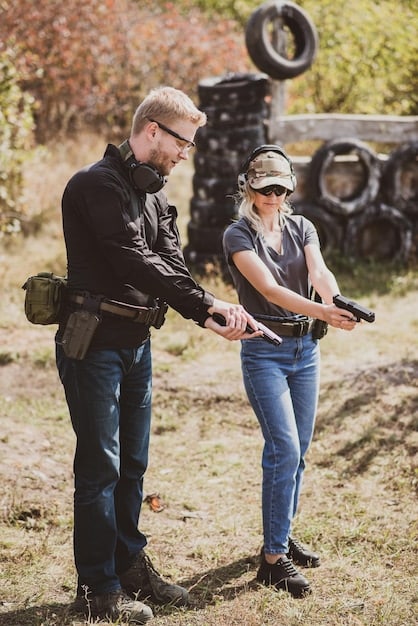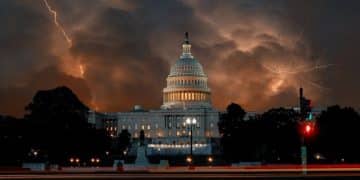Republican Party Gun Control Stance in 2025: Key Issues Analyzed

The Republican Party’s stance on gun control in 2025 is expected to remain largely conservative, focusing on the Second Amendment rights while addressing specific concerns like background checks and assault weapons through potential legislative actions.
Navigating the complex landscape of gun control in the United States requires understanding the perspectives of its major political parties. In this article, we delve into the Republican Party’s stance on gun control in 2025: Analyzing the party’s position on background checks, assault weapons, and other key issues, providing insights into their potential policies and legislative priorities.
Understanding the Republican Platform on Gun Rights
The Republican Party’s platform on gun rights is deeply rooted in the Second Amendment of the United States Constitution, which guarantees the right of the people to keep and bear arms. Understanding this foundation is crucial to analyzing their stance on gun control in 2025.
The Second Amendment: A Cornerstone of Republican Ideology
Republicans generally view the Second Amendment as an individual right, not a collective one tied to militia service. This interpretation shapes their opposition to many forms of gun control, which they believe infringe upon this fundamental right.
Key Principles Guiding Republican Gun Policy
Several key principles guide the Republican approach to gun policy. These include an emphasis on self-defense, responsible gun ownership, and the belief that existing laws should be enforced more effectively rather than creating new restrictions.
- Protecting the rights of law-abiding citizens to own firearms for self-defense.
- Opposing measures that could disarm individuals without due process.
- Focusing on mental health and addressing the root causes of gun violence.
- Strengthening background checks while safeguarding privacy rights.
The Republican Party consistently emphasizes the importance of preserving Second Amendment rights while addressing issues of public safety. Their approach often involves supporting initiatives that promote responsible gun ownership and mental health awareness rather than advocating for stricter gun control laws.

Background Checks: A Point of Contention
Background checks are a central issue in the gun control debate, particularly concerning the extent to which they should be expanded. The Republican Party’s stance on background checks in 2025 is likely to reflect a balance between ensuring public safety and protecting individual rights.
Current Federal Laws on Background Checks
Under current federal law, licensed gun dealers are required to conduct background checks on potential buyers through the National Instant Criminal Background Check System (NICS). This system screens for criminal records, domestic violence restraining orders, and other disqualifying factors.
Republican Proposals for Improving the NICS
While generally supportive of background checks, Republicans often advocate for improvements to the NICS system rather than expanding its scope to include private gun sales. These improvements may include:
- Ensuring that all relevant records are accurately and promptly entered into the NICS database.
- Streamlining the process for reporting mental health information to the system.
- Addressing loopholes that allow individuals with disqualifying conditions to obtain firearms.
Republicans typically emphasize the need to improve the efficiency and accuracy of the existing background check system, focusing on enforcing current laws and addressing systemic issues that may allow prohibited individuals to acquire firearms. They are often wary of universal background checks, which they argue could burden law-abiding citizens and infringe on their Second Amendment rights.
Assault Weapons Bans: A Firm Opposition
Assault weapons bans have been a contentious issue in American politics for decades. Understanding the Republican Party’s firm opposition to such bans is crucial to predicting their stance on gun control in 2025.
Defining “Assault Weapons”
The term “assault weapon” is not consistently defined, but it generally refers to semi-automatic firearms with certain military-style features, such as detachable magazines and pistol grips. Critics of these weapons argue that they are designed for combat.
Republican Arguments Against Bans
Republicans argue against assault weapons bans on several grounds. They contend that these bans are ineffective in reducing crime, infringe on the rights of law-abiding citizens, and are often based on cosmetic features rather than functional differences.
- “Assault weapons” are commonly used for sport shooting and hunting.
- Bans do not address the underlying causes of gun violence.
- Existing laws can be used to prosecute individuals who misuse firearms.
The Republican Party generally opposes any measures that would ban or severely restrict the sale and ownership of “assault weapons.” They maintain that these weapons are commonly used for legitimate purposes and that restrictions would disproportionately affect law-abiding citizens without significantly improving public safety.

Red Flag Laws: A Mixed Reception
Red flag laws, also known as extreme risk protection orders (ERPOs), allow law enforcement or family members to petition a court to temporarily remove firearms from individuals deemed a danger to themselves or others. The Republican Party’s reception to these laws is mixed.
How Red Flag Laws Work
Red flag laws typically require a court hearing where evidence is presented to demonstrate that the individual poses a significant risk of harm. If the court agrees, an order is issued, and law enforcement can temporarily seize the individual’s firearms.
Republican Concerns and Support
Some Republicans support red flag laws as a potential tool for preventing gun violence, particularly in cases involving mental health crises or domestic disputes. However, others express concerns about due process and the potential for abuse.
Safeguards and Due Process
Republicans are more likely to support red flag laws if they include strong due process protections, such as:
- Requiring clear and convincing evidence to support the order.
- Providing individuals with the right to legal representation.
- Ensuring a timely hearing to challenge the order.
- Establishing penalties for false or malicious petitions.
The Republican Party’s overall stance on red flag laws is complex and varies among individual members. While some see potential benefits in preventing gun violence, others remain wary of potential infringements on Second Amendment rights and due process protections. Any support for these laws is likely contingent upon the inclusion of robust safeguards to prevent abuse.
Mental Health and Gun Violence: A Common Ground
Addressing the intersection of mental health and gun violence is an area where Republicans often find common ground with Democrats. Recognizing the importance of mental health care can shape the Republican Party’s stance on gun control in 2025.
Focus on Mental Health Services
Republicans frequently emphasize the need to improve access to mental health services as a key component of reducing gun violence. This approach focuses on addressing the underlying causes of violence rather than restricting access to firearms.
Specific Republican Proposals
Specific Republican proposals in this area often include:
- Increasing funding for mental health programs and research.
- Improving coordination between mental health providers and law enforcement.
- Expanding access to mental health services in schools and communities.
Promoting Early Intervention
By focusing on mental health, Republicans hope to identify and treat individuals who may be at risk of committing violence, ultimately reducing the likelihood of gun-related incidents. This approach aligns with their broader emphasis on addressing the root causes of violence rather than solely focusing on gun control measures.
The Republican Party’s emphasis on mental health as a factor in gun violence reflects a broader belief that addressing the underlying causes of violence is more effective than restricting access to firearms. By promoting access to mental health services and early intervention programs, they hope to reduce the incidence of gun-related tragedies while upholding Second Amendment rights.
The Influence of the NRA and Gun Lobby
The National Rifle Association (NRA) and other gun lobby groups wield significant influence over the Republican Party. Understanding this influence is pivotal to analyzing the Republican Party’s stance on gun control in 2025.
The NRA’s Role in Shaping Policy
The NRA is a powerful advocacy group that lobbies lawmakers, contributes to political campaigns, and mobilizes its members to support or oppose gun control legislation. Its influence within the Republican Party is substantial.
Republican Alignment with the NRA
Many Republican politicians align closely with the NRA’s positions on gun rights, often echoing the group’s arguments against stricter gun control laws. This alignment is due to a combination of shared ideological beliefs, political considerations, and financial support.
Impact on Legislative Outcomes
The NRA’s influence often translates into legislative gridlock on gun control issues, as Republicans are hesitant to support measures that could alienate the group and its members. This dynamic is expected to persist in 2025, shaping the Republican Party’s approach to gun policy.
The influence of the NRA and other gun lobby groups is a significant factor in shaping the Republican Party’s stance on gun control. Their advocacy efforts and financial contributions often align with Republican principles, leading to a strong resistance against stricter gun control measures.
| Key Point | Brief Description |
|---|---|
| 🛡️ Second Amendment Support | Firm commitment to protecting the right to bear arms. |
| 🔍 Background Checks | Focus on improving existing system, not expanding it. |
| 🚫 Assault Weapons Bans | Strong opposition, citing Second Amendment rights. |
| 🧠 Mental Health Focus | Emphasis on improving access to mental health services. |
Frequently Asked Questions
▼
The Republican Party generally opposes stricter gun control measures, emphasizing the importance of the Second Amendment and individual rights to bear arms.
▼
Most Republicans do not support universal background checks, arguing that they burden law-abiding citizens and infringe on their Second Amendment rights.
▼
Republicans often propose improving mental health services, enforcing existing laws, and promoting responsible gun ownership as alternatives to stricter gun control.
▼
The NRA significantly influences Republican gun policy through lobbying, campaign contributions, and mobilizing its members to support or oppose legislation.
▼
The Republican stance on gun control is expected to remain largely consistent in 2025, with a focus on Second Amendment rights and responsible gun ownership.
Conclusion
Analyzing the Republican Party’s stance on gun control in 2025 reveals a consistent commitment to the Second Amendment, responsible gun ownership, and addressing the underlying causes of gun violence. While specific policies may evolve, the core principles guiding their approach are expected to remain consistent, shaping the future of gun control debates in the United States.





